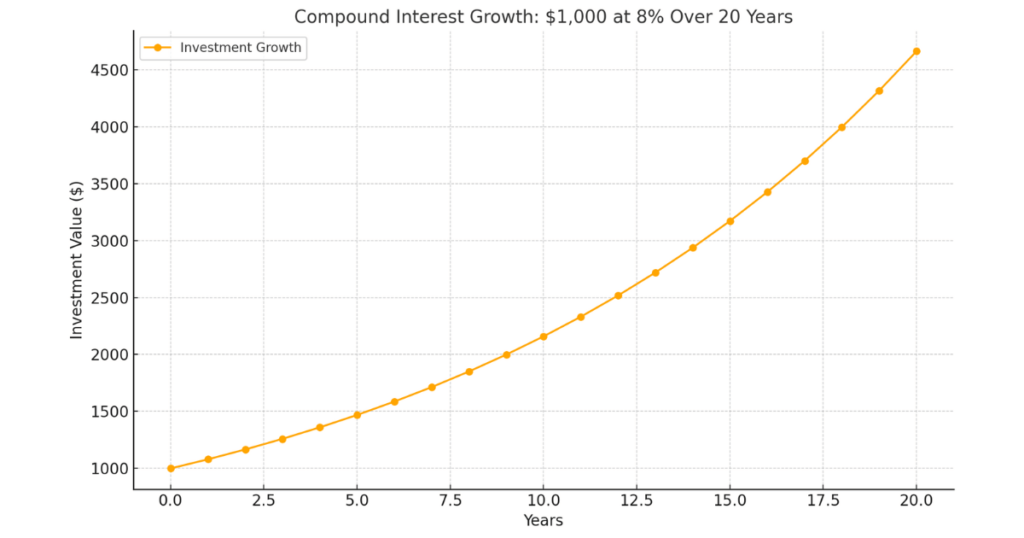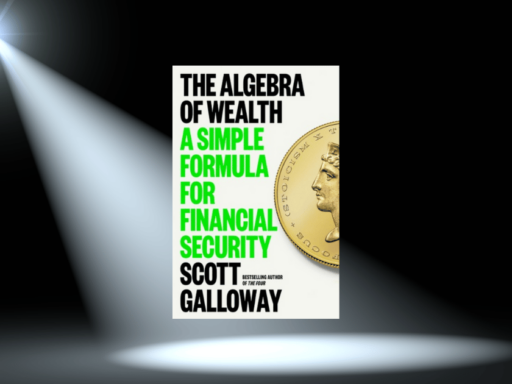Imagine this: You’re the only one working to build your financial future. Every day, you put in hours, earn your paycheck, and save what you can. Now, picture hiring someone—let’s call them your “financial worker”—to help out. This worker never takes breaks, doesn’t need coffee, and keeps earning for you while you sleep. Sounds nice, right? That’s exactly what compound interest does. It’s like building a team of tireless helpers to grow your wealth.
Let’s break it down.
The Compound Interest Workforce: A Story of Financial Freedom
Think of your money as your first worker. When you invest, it starts to earn interest. That interest is like hiring a second worker. Now, you’ve got two contributors: your initial investment and the interest it earned.
But here’s where the magic happens: that second worker, the interest, also starts earning interest. It’s as if they hire a third worker, then a fourth, and so on. Over time, this team grows without you needing to do much more than stay consistent.
At first, the growth is slow—your initial worker can only do so much. But as the years go by, your financial team expands. Eventually, your team’s output (the money it generates) far outpaces what you could earn on your own. At that point, you’ve built a system that sustains itself (retirement). That’s the power of compound interest.
How Compound Interest Works in Simple Terms
Let’s keep this straightforward. When you invest money, it earns interest. If you leave that interest alone, it doesn’t just sit there—it starts earning interest on itself. That’s compound interest.
Here’s an example: Say you invest $1,000 with an annual interest rate of 8%. In the first year, you’d earn $80 in interest. If you reinvest that $80, the next year your interest is calculated on $1,080. By year three, it’s $1,166.40, and the snowball keeps rolling.
The longer you let this cycle run, the bigger the snowball gets. This exponential growth is what makes compound interest so powerful. It’s not about adding more snow (or money) every year—it’s about letting it build on itself.

Why Starting Early is a Game-Changer
Time is compound interest’s best friend. The earlier you start investing, the more time your money has to grow—and grow exponentially.
Let’s compare three scenarios:
- If you invest $10,000 at age 25 and leave it alone until 65, you’ll have about $217,000 (assuming an 8% return).
- Start at 35 instead, and you’ll end up with $100,000 less, even if you invest the same amount.
- Wait until 45? You’ll only have about $70,000.
The difference is staggering, and it’s all because of time. Those extra years allow your financial team to grow bigger and faster. The early years might feel slow, but they’re the most important because they set the stage for exponential growth later.
What If You Start Late? Making Compound Interest Work in Your 40s and 50s
If you didn’t start early, don’t worry—it’s never too late to benefit from compound interest. You just need to approach it with a focused strategy.
Here’s how to make the most of it:
- Start Now: The sooner you invest, the sooner your money starts working for you. Even if you’re in your 40s or 50s, every year counts.
- Invest Aggressively: With less time, consider investments with higher growth potential, like stocks. They’re riskier, but they offer better long-term returns.
- Max Out Retirement Accounts: Take full advantage of accounts like 401(k)s or IRAs. If you’re over 50, use catch-up contributions to add even more.
- Contribute More: If you’re earning more at this stage in life, use that to your advantage. Larger contributions can help make up for lost time.
- Stay Consistent: Even during retirement, let part of your investments continue to grow. Compounding doesn’t stop when you retire!
Starting late means you might not see the same exponential growth as someone who started in their 20s, but it can still make a significant difference in your financial future.
The Key to Unlocking Compound Interest: Consistency and Patience
There are two things you need to make compound interest work: consistency and patience.
- Consistency means regularly contributing to your investments, no matter how small. It’s like adding fuel to a fire. Even small, steady contributions add up over time.
- Patience is letting your money grow without pulling it out too soon. This is where many people struggle. Watching your investments fluctuate can be nerve-wracking, but staying the course is crucial.
Compound interest rewards those who stick with it. The longer you leave your money invested, the more powerful the compounding effect becomes.
Reaching Financial Freedom: Letting Your Money Work for You

At some point, your financial team grows large enough to handle everything for you. The money you’ve invested—and the interest it’s earned—becomes your primary source of income. You no longer need to rely on a paycheck to cover your expenses.
This is what financial freedom looks like:
- No more working just to pay bills.
- The freedom to pursue your passions or retire early.
- A sense of security knowing your financial system can sustain itself.
It all starts with one simple step: hiring your first “worker” by investing.
Common Missteps and How to Avoid Them
Compound interest is powerful, but it’s easy to make mistakes that limit its potential. Here are a few common ones and how to avoid them:
- Starting Too Late: Time is your biggest asset, so don’t wait. Start now, even if it’s with a small amount.
- Interrupting Growth: Withdrawing investments early can undo years of progress. Keep your money invested as long as possible.
- High-Fee Investments: Fees can eat into your returns. Choose low-cost index funds or ETFs to minimize this.
- Not Staying Consistent: Skipping contributions slows your progress. Automate them to stay on track.
Avoiding these pitfalls helps ensure you get the most out of compound interest.
Conclusion: Start Building Your Financial Team Today
Compound interest is one of the simplest, yet most powerful tools for building wealth. It’s like hiring a team of tireless workers to grow your money while you focus on other things.
Whether you’re just starting out or getting a late start, the key is to begin now and stay consistent. The sooner you “hire” that first worker, the sooner you can build your financial freedom.
Take that first step today. Your future self—and your financial team—will thank you.






